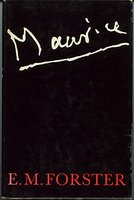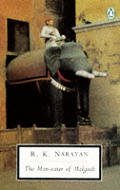Forster, E.M. Maurice (1971). New York: Signet, 1973.
 Forster Finished! this novel in 1914 but didn’t allow its publication until after his death, and he lived a very long time. It’s fortunate that he lived after Stonewall, and so this book was able to get read at a time that gays and lesbians were actively fighting for equal rights. Playboy of all people called the book “The literary sensation of the year!” Or at least so the back cover of my supercrappy Signet edition (not pictured left) says.
Forster Finished! this novel in 1914 but didn’t allow its publication until after his death, and he lived a very long time. It’s fortunate that he lived after Stonewall, and so this book was able to get read at a time that gays and lesbians were actively fighting for equal rights. Playboy of all people called the book “The literary sensation of the year!” Or at least so the back cover of my supercrappy Signet edition (not pictured left) says.At the center of the novel are three figures: Maurice (say /MOR-ris/) is a handsome and athletic young man who meets Clive—richer, smarter, though less healthy—at Cambridge. Clive professes his love to Maurice and Maurice says “Oh, rot!” and is scandalized. But then he realizes that he, too, loves Clive, and that this quality of difference he’s always felt is in fact gayness.
Well. So Clive and Maurice finally get it together and have a nice, though by all signs chaste, romance for three years. (I think they kiss once.) Then Clive changes, and decides he loves women, or at least wants to love women. Maurice is heartbroken, tries to change as wel, fails despite repeated visits to a hypnotherapist, and eventually falls in love with Clive’s gameskeeper, Alec, who is cockney and brawny and, I imagine, hot-with-two-T’s. (These two actually sleep together in beds.) They live happily ever after.
I’m strill trying to get my head around the Clive/Maurice duo; why Forster decided to put the closeted man who refuses love at the center of the book. Why Maurice wasn’t the seducer. I imagine we’re able “to relate” more to him the way Forster did it. That is, as Maurice gradually enters the adult world, where men can love men and it’s shocking and wonderful, those shocks are delivered through us to him, in a way. (By “us” I mean the majority of Forster’s reader who themselves aren’t accustomed to this world.) Because this is new to us, because we are shocked by it, that all must happen to/with Maurice, so that as he changes we change in turn.
It’s nice (and of course vital to Forster’s project) that this novel ends with two men in love. Forster says in his end note that this is what made the novel unpublishable for so long. “If it ended unhappily, with a lad dangling from a noose or with a suicide pact, all would be well,” he writes. Eighty years later, enter Annie Proulx and Ang Lee.








